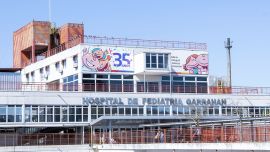Argentina’s parallel exchange rate weakened past a key threshold on Friday, as demand for assets in hard currency climbed ahead of the upcoming midterm elections in November.
The blue-chip swap exchange rate, derived from buying shares locally and then selling them abroad for dollars, weakened to 201.6 per USD at 1.42pm in Buenos Aires. The spread between the official peso and the blue-chip rose to 102.3 percent, up from 100.5 percent yesterday, its widest in at least a year.
Local investors have grown increasingly pessimistic on the peso, betting that the government will be forced to speed up devaluation after November elections.
President Alberto Fernández’s administration has insisted on a slow depreciation of the official exchange rate, keeping the currency overvalued via strict capital controls to protect reserves as it tries to tamp down on inflation running at more than 50 percent annually.
“This pressure is exactly what’s necessary for Fernández to moderate,” said Siobhan Morden, head of Latin America fixed income at Amherst Pierpont in New York. The government’s “policies are now fully reaching an inflection point, now that net liquid foreign reserves are negative.”
The government says it will continue implementing the currency policy laid out in the 2021 budget, and that a sudden jump in the exchange rate isn’t forecasted or planned, Economy Minister Martín Guzmán said on Thursday.
by Scott Squires & Ignacio Olivera Doll, Bloomberg


















Comments